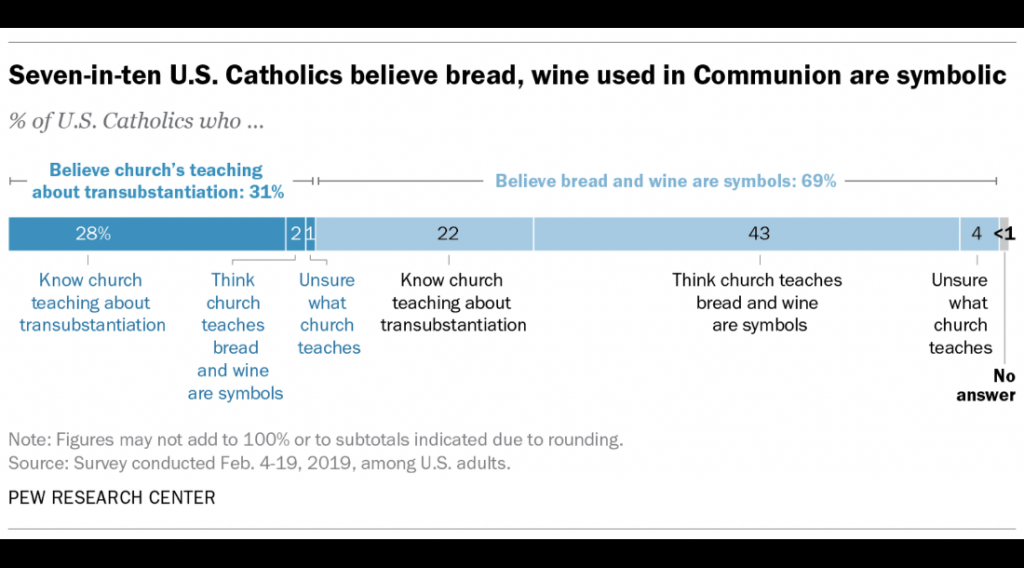Skwim
Veteran Member
.

"When it comes to religion, it’s pretty obvious Americans don’t know much about faith. The Pew Research Center revealed last week that Jews and atheists scored higher than any other group on a 32-question quiz about basic religious beliefs… and even they scored 18.7 and 17.9, respectively.
But even if Americans didn’t know much about other religions, you would think they’d understand the basic tenets of their own religion.
Not so when it comes to Catholics.
In a follow-up report, Pew found that fewer than a third of self-proclaimed Catholics accept the Church’s fundamental belief that a consecrated communion wafer is literally the body of Christ.

It’s not a symbol, like Protestants believe. Catholics say those wafers are actually God. They are biting into Jesus. That’s what transubstantiation is. It’s not a random belief; it’s a big deal. Hell, the Eucharist is one of the sacraments.
How could you be Catholic while rejecting a main belief of the Catholic Church?
(Maybe that’s somewhat rhetorical, given how many Catholics reject the Church’s positions on abortion and marriage equality.)
The numbers show only 28% of Catholics accept the Church’s teachings on the matter while 69% say the bread and wine are symbols… regardless of what the Church teaches.
Maybe the strangest thing about these results is that 50% of Catholics know what the Church says about transubstantiation… but nearly half of them don’t buy it.
I guess that means there’s hope for them. Maybe they cling to the Catholic label for cultural reasons or because of family pressure, but even they know the Church’s beliefs are absurd. Those 22% of Catholics in the middle, I would suspect, are made up of a lot of future atheists.
source

Whaaaaaa . . . . . .
But even if Americans didn’t know much about other religions, you would think they’d understand the basic tenets of their own religion.
Not so when it comes to Catholics.
In a follow-up report, Pew found that fewer than a third of self-proclaimed Catholics accept the Church’s fundamental belief that a consecrated communion wafer is literally the body of Christ.

It’s not a symbol, like Protestants believe. Catholics say those wafers are actually God. They are biting into Jesus. That’s what transubstantiation is. It’s not a random belief; it’s a big deal. Hell, the Eucharist is one of the sacraments.
How could you be Catholic while rejecting a main belief of the Catholic Church?
(Maybe that’s somewhat rhetorical, given how many Catholics reject the Church’s positions on abortion and marriage equality.)
The numbers show only 28% of Catholics accept the Church’s teachings on the matter while 69% say the bread and wine are symbols… regardless of what the Church teaches.
Maybe the strangest thing about these results is that 50% of Catholics know what the Church says about transubstantiation… but nearly half of them don’t buy it.
I guess that means there’s hope for them. Maybe they cling to the Catholic label for cultural reasons or because of family pressure, but even they know the Church’s beliefs are absurd. Those 22% of Catholics in the middle, I would suspect, are made up of a lot of future atheists.
source
.
Last edited:

